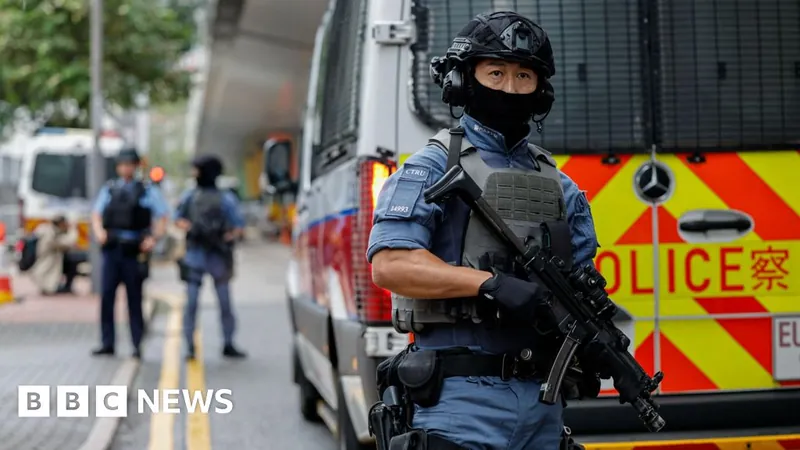
Shocking Sentencing: 45 Pro-Democracy Leaders Behind Bars in Hong Kong
2024-11-19
Author: Ling
Shocking Sentencing: 45 Pro-Democracy Leaders Behind Bars in Hong Kong
In a controversial ruling that has sent shockwaves through the city, a Hong Kong court has sentenced 45 pro-democracy leaders to lengthy prison terms for subversion, a move critics are calling a blatant violation of political freedoms. The sentences stem from an infamous national security trial that many believe undermines the very essence of Hong Kong’s autonomy.
Among those sentenced were high-profile activists Benny Tai, 60, and Joshua Wong, 28, both prominent figures in the pro-democracy movement. Benny Tai received a staggering 10-year sentence, while Joshua Wong, who has been a face of Hong Kong's fight for democracy since his teenage years, was handed a more than four-year sentence. This trial marks the largest since the enforcement of the National Security Law (NSL) in 2020, a legislative move that has been viewed as a tool for Beijing to tighten its grip on the former British colony.
The Hong Kong 47, as this group of activists is known, organized an unofficial primary election in 2020 aimed at selecting opposition candidates for local elections. Their efforts drew massive public participation, with over half a million residents casting votes in a show of support for democratic processes. However, the Chinese government viewed this as a direct challenge to its authority, leading to widespread arrests in early 2021.
Advocates for democracy argue that the NSL and the outcomes of these trials have effectively dismantled the pro-democracy movement and the rule of law in Hong Kong. Beijing officials have defended the law as essential for maintaining stability, asserting that the sentences serve as a stern warning to anyone thinking of undermining national security.
The emotional impact of the sentencing rippled through the pro-democracy community, with many activists and supporters expressing their heartbreak. Emily Lau, a former chair of the Democratic Party of Hong Kong, voiced the sorrow felt by the families of the defendants as they were unable to witness the proceedings due to the overwhelming interest from the public.
Inside the court, family members anxiously awaited the verdicts, with emotions running high. Many watched tearfully as the sentences were delivered, each one punctuated by the realization of the toll these political maneuvers have taken on individuals who have dedicated their lives to advocating for democracy.
Despite facing the harsh realities of their sentencing, activists like Wong remained defiant, expressing their unyielding love for their home, declaring, "I love Hong Kong" as he exited the courtroom.
Internationally, the responses have been swift and critical, with the British government condemning the sentences as a clear violation of free speech and political participation rights. The US echoed these sentiments, labeling the trial as politically motivated. Australia also expressed grave concerns, particularly regarding the sentence handed to one of its citizens, Gordon Ng.
As the dust settles on this landmark trial, experts warn that the ramifications extend far beyond the 45 individuals imprisoned. John P. Burns, an emeritus professor at the University of Hong Kong, emphasized that the case would have lasting effects on the legal landscape and the social fabric of Hong Kong, instilling fear among those who dare to voice dissent.
The chilling reality is that, in a city once known for its vibrant protests and public demonstrations, voices are now silenced, and the spirit of activism seems to be fading. Observers fear that the future of Hong Kong's democracy hangs in the balance, raising critical questions: Is this the end of political dissent in the city? How many more will be silenced under the weight of the National Security Law? In a place where freedoms once thrived, could the dawn of a new era of repression be upon us?


 Brasil (PT)
Brasil (PT)
 Canada (EN)
Canada (EN)
 Chile (ES)
Chile (ES)
 España (ES)
España (ES)
 France (FR)
France (FR)
 Hong Kong (EN)
Hong Kong (EN)
 Italia (IT)
Italia (IT)
 日本 (JA)
日本 (JA)
 Magyarország (HU)
Magyarország (HU)
 Norge (NO)
Norge (NO)
 Polska (PL)
Polska (PL)
 Schweiz (DE)
Schweiz (DE)
 Singapore (EN)
Singapore (EN)
 Sverige (SV)
Sverige (SV)
 Suomi (FI)
Suomi (FI)
 Türkiye (TR)
Türkiye (TR)